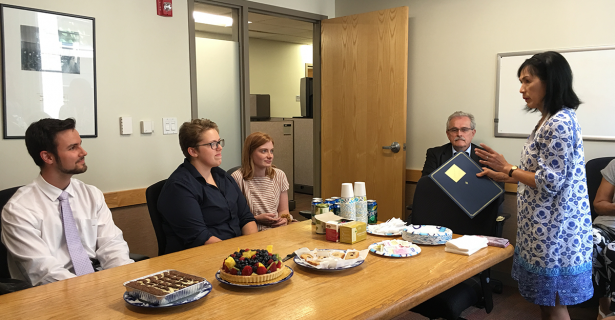I concluded my internship with the Office for Refugees and Immigrants (ORI) on the final day of July, but my final week involved the most rewarding and exciting activities of the summer.
On July 30, I had the privilege of observing a meeting between the Office for Refugees and Immigrants and six British Members of Parliament (MP). The MP’s were visiting US governmental organizations to learn more about American immigration processes and programs, so we were there to help educate. Another intern and I joined our coworkers for the meeting and listened as Mary Truong, ORI Executive Director, and Falah Hashem, ORI Chief of Staff, gave an overview of the department and several of our programs offered to newcomers.
When the floor was open for questions, the MP’s inquired about differences between federal and state control as well as how willing and open the Massachusetts public was to accepting refugees. One of the ORI program directors brought up that US refugee intake is much lower this year largely due to federal policies out of their control, and this sparked a debate on immigration from the various MP’s, all very clearly representing different political parties and ideologies. It was as if I was watching a live debate from the House of Parliament, and I was completely enthralled.
It was a completely unique opportunity that gave me insight into diplomacy and public policy on a state, federal, and international level. Escorting the MP’s were people from the Department of State who were also able to assist in answering questions about different policies or procedures outside of state jurisdiction. Although there was playful banter exchanged between the MP’s about their respective cities, there was also poignant discussion about different communities reacting differently to immigration policies. As one of the conservative politicians pointed out, areas that are least affected by immigration tend to be the most against it, simply because they do not engage with or understand the refugee situation. It was refreshing to see engaging debate.
At the conclusion of my time with ORI, I was able to view a finished version of my report on the Financial Literacy for Newcomers (FLN) project. I worked closely with the FLN program director to calculate data from post-program surveys and format a design that was different from the traditional, bureaucratic style. It was the culmination of two months of incredible learning experiences and concentrated effort. I was honored to have been put in charge of such an important piece of literature that will continue to shape how the information about the program is disseminated.
I was excited to bring my expertise in photoshop, data analysis, and editing together to create a final product that would benefit both the participants and ORI staff. Going forward, I am grateful to continue working with the ORI on future projects. This opportunity has introduced me to international and state perspectives on migration that would be inaccessible without an organization like the ORI. Its work is essential for such a pressing global issue, and I was honored to be a part of the team.

